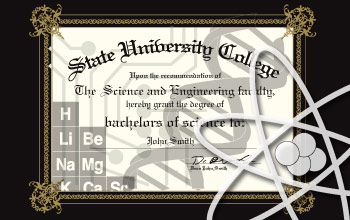News Release 06-117
A Science or Engineering Bachelor's Degree Is Good for You
Degree holders find it valuable in a variety of jobs

A science or engineering bachelor's degree is useful even in non-technical jobs.
August 14, 2006
This material is available primarily for archival purposes. Telephone numbers or other contact information may be out of date; please see current contact information at media contacts.
Earning a bachelor's degree in science or engineering (S&E) appears to serve the recipient well in the workforce, regardless of the job they do. In fact, according to a National Science Foundation (NSF) survey, people who have earned an S&E bachelor's degree generally report that science and engineering knowledge is important to their job.
That holds even if the graduate ends up doing non-technical work. According to the survey, among those workers whose only degree was an S&E bachelor's, 27 percent had S&E occupations. Sixty-three percent working in non-technical fields still said their jobs were related to their S&E degree.
Some 400,000 sales workers, for example, reported their job was related to their S&E bachelor's degree. And a majority of S&E bachelor's degree holders employed as artists, editors or writers reported their degree was at least somewhat related to their job.
Of those who went on to receive advanced degrees, the largest proportion, almost 29 percent, took those degrees in non-S&E fields, namely business, law or medicine.
"S&E knowledge remained important to the jobs of most S&E bachelor's holders with advanced degrees--being reported as necessary by a majority of both those with master's degrees in business and those with other non-S&E advanced degrees," the survey said.
The data are reported in the NSF InfoBrief, What Do People Do After Earning a Science and Engineering Bachelor's Degree?
The report used data from the NSF's 2003 SESTAT survey--a pooled set of large demographic and workforce surveys--and included responses from people who had earned a bachelor's degree in science or engineering at least 10 years earlier.
About half of those who earned an S&E bachelor's earned no additional degree. Only slightly more than 4 percent earned a Ph.D. in the same field as their bachelor's. The remainder earned advanced degrees in a wide variety of fields.
-NSF-
Media Contacts
Leslie Fink, National Science Foundation, (703) 292-5395, email: lfink@nsf.gov
Program Contacts
Mark Regets, National Science Foundation, (703) 292-7831, email: mregets@nsf.gov
Related Websites
InfoBrief: What Do People Do After Earning an S&E Bachelor's Degree?: http://www.nsf.gov/statistics/infbrief/nsf06324/
The U.S. National Science Foundation propels the nation forward by advancing fundamental research in all fields of science and engineering. NSF supports research and people by providing facilities, instruments and funding to support their ingenuity and sustain the U.S. as a global leader in research and innovation. With a fiscal year 2023 budget of $9.5 billion, NSF funds reach all 50 states through grants to nearly 2,000 colleges, universities and institutions. Each year, NSF receives more than 40,000 competitive proposals and makes about 11,000 new awards. Those awards include support for cooperative research with industry, Arctic and Antarctic research and operations, and U.S. participation in international scientific efforts.
Connect with us online
NSF website: nsf.gov
NSF News: nsf.gov/news
For News Media: nsf.gov/news/newsroom
Statistics: nsf.gov/statistics/
Awards database: nsf.gov/awardsearch/
Follow us on social
Twitter: twitter.com/NSF
Facebook: facebook.com/US.NSF
Instagram: instagram.com/nsfgov


